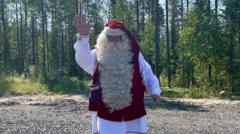In a season where cold and snow usually reigns, Santa Claus finds himself advising his elves on hydration amidst an unprecedented heatwave sweeping across Lapland. Northern Finland is grappling with temperatures reaching around 30°C, prompting Santa to retreat indoors, where his traditional red-and-white attire feels increasingly oppressive. "I’ll only venture out for a swim in the evening when it cools down," he remarks.
The heatwave, which has enveloped Rovaniemi for 15 consecutive days, is a stark reminder of changing climatic conditions - a fact underscored by meteorologist Jaakko Savela from the Finnish Meteorological Institute. The region, which rarely experiences temperatures above 30°C, is now witnessing its longest recorded heatwave since 1972. Other locales in Lapland also experience similarly intolerable conditions, with Ylitornio and Sodankylä recently registering record highs of 31.7°C—nearly 10°C above average.
This extreme heat has ignited concerns regarding the accelerating pace of climate change in the Arctic, where temperatures are rising at a rate four to five times faster than global averages. Scientists indicate that while this particular wave may not have stemmed directly from climate change, the overall conditions contributing to it are undeniably influenced by global warming. Professor Jeff Weller from the University of Oulu stresses that extreme weather patterns are becoming increasingly common due to human activity.
The ramifications extend beyond the human realm; Lapland's native reindeer, celebrated worldwide as Santa's iconic companions, are also feeling the effects as they flock to roads seeking refuge from relentless mosquitoes thriving in the heat. With options limited, some experts warn that reindeer herders may need to construct shaded shelters to protect their herds.
The shift in climate has not gone unnoticed by visitors either. Tourists flocking to Rovaniemi for the cooler climate find themselves bewildered as they endure sweltering heat instead. "I expected much colder weather and packed the wrong clothes," lamented Silvia from Prague, revealing the unexpected challenge facing travelers lured to the Arctic's typical allure of brisk conditions.
As summer days stretch to nearly 20 hours of sunlight, the extended daylight only exacerbates the heat. Santa’s elves are just as concerned, with one remarking, "I can't help but worry if this is going to be our new reality."
With every passing summer, Santa - a figure synonymous with winter joy - finds himself longing for the beloved chill, treasuring memories of snowy landscapes now at risk due to the rising temperatures. "Sure, warm summers are nice for some, but I much prefer the cold and snow," Santa sighs, wistfully reminiscing about the winter seasons that once defined his life in Lapland.
The heatwave, which has enveloped Rovaniemi for 15 consecutive days, is a stark reminder of changing climatic conditions - a fact underscored by meteorologist Jaakko Savela from the Finnish Meteorological Institute. The region, which rarely experiences temperatures above 30°C, is now witnessing its longest recorded heatwave since 1972. Other locales in Lapland also experience similarly intolerable conditions, with Ylitornio and Sodankylä recently registering record highs of 31.7°C—nearly 10°C above average.
This extreme heat has ignited concerns regarding the accelerating pace of climate change in the Arctic, where temperatures are rising at a rate four to five times faster than global averages. Scientists indicate that while this particular wave may not have stemmed directly from climate change, the overall conditions contributing to it are undeniably influenced by global warming. Professor Jeff Weller from the University of Oulu stresses that extreme weather patterns are becoming increasingly common due to human activity.
The ramifications extend beyond the human realm; Lapland's native reindeer, celebrated worldwide as Santa's iconic companions, are also feeling the effects as they flock to roads seeking refuge from relentless mosquitoes thriving in the heat. With options limited, some experts warn that reindeer herders may need to construct shaded shelters to protect their herds.
The shift in climate has not gone unnoticed by visitors either. Tourists flocking to Rovaniemi for the cooler climate find themselves bewildered as they endure sweltering heat instead. "I expected much colder weather and packed the wrong clothes," lamented Silvia from Prague, revealing the unexpected challenge facing travelers lured to the Arctic's typical allure of brisk conditions.
As summer days stretch to nearly 20 hours of sunlight, the extended daylight only exacerbates the heat. Santa’s elves are just as concerned, with one remarking, "I can't help but worry if this is going to be our new reality."
With every passing summer, Santa - a figure synonymous with winter joy - finds himself longing for the beloved chill, treasuring memories of snowy landscapes now at risk due to the rising temperatures. "Sure, warm summers are nice for some, but I much prefer the cold and snow," Santa sighs, wistfully reminiscing about the winter seasons that once defined his life in Lapland.



















